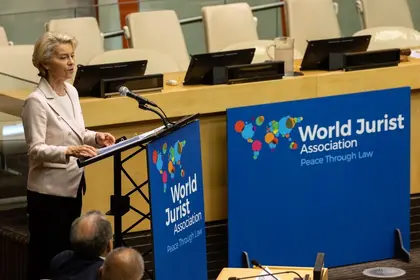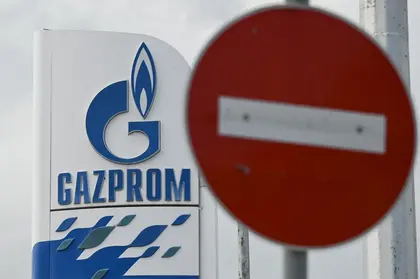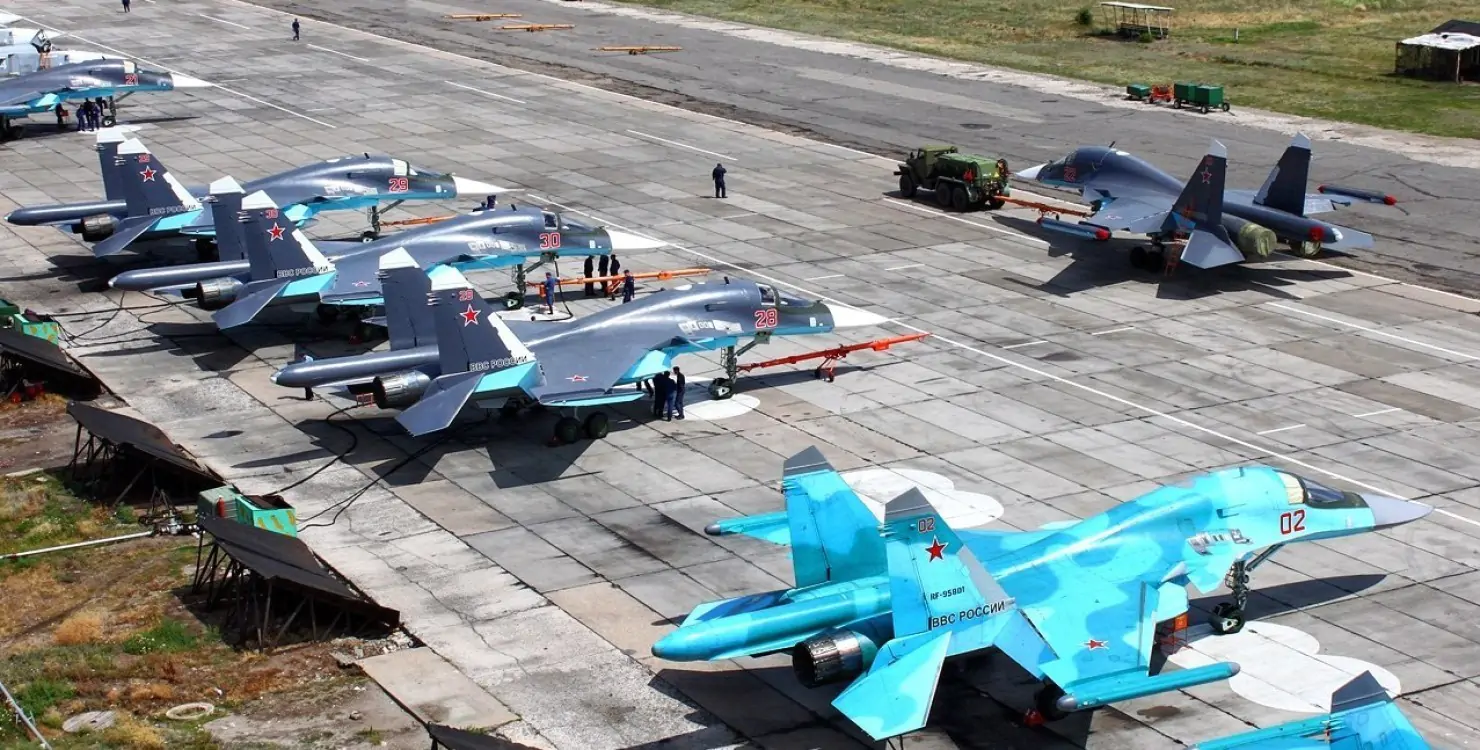This is the text of the speech by President von der Leyen at the award ceremony for the ‘World Peace & Liberty Award' to the European Commission delivered in New York on July 21.
JOIN US ON TELEGRAM
Follow our coverage of the war on the @Kyivpost_official.
Distinguished guests, Ladies and Gentlemen,
What an honor to receive this award on behalf of the European Commission, and this on the occasion of the 60th anniversary of the World Jurist Association. A network of jurists that would defend fundamental rights and the rule of law across the world, as a contribution to global peace. 60 years on, you are still faithful to your foundation and your principles. And I want to thank the World Jurist Association not only for this recognition but for your enduring service to all humanity.
Peace through the rule of law is also the story of a united Europe. When World War II ended, Europe was in ruin and ashes, and European countries mortal enemies. Five of them decided to forgive. Not to forget, but to forgive. They stretched out their hand to Germany and others, and over time invited them back into the circle of democracies. Under one condition: to do everything necessary for a just and lasting peace, grounded on the rule of law.
My father was 15 years old when World War II ended. His generation had grown up in Germany surrounded by lawlessness, devastation and the negation of human dignity. His country had brought death and destruction to the whole world. Around him was only shame and despair. And then the European idea was born. He was overwhelmed by the power of reconciliation and the rule of law. In 1957, he witnessed the foundation of the European Economic Community, the beginning of the European Union, with only six members at that time. He dedicated his whole life to serving the European idea. When he passed away in 2014, the European Union had grown to 28 Member States.

Best Christmas Markets in Europe 2024
The story of our Union is one of democracies, young and old, getting stronger together. It is the story of Germany's and Italy's rebirth after the war. It is the story of Spain's, Portugal's and Greece's path from dictatorship to democracy. It is the story of democratic renaissance after the fall of the Iron Curtain. And the next chapter in this story is being written today – in Ukraine, Moldova and Georgia, as well as in the Western Balkans. This is Europe's promise: A united continent, where all are equal before the law, with freedom and democracy for all. But what does it mean for today's Europeans to build peace through the rule of law? What is Europe's mission in this new and turbulent era in the history of the world? This is the question on which I would like to share some thoughts with you today.
Ukraine is not only fighting for its own freedom. Ukraine is fighting for the freedom of every country.
The first part of the answer still has to do with the United Nations Charter and global peace. Vladimir Putin has brought war back to the European continent. Not only is he committing unspeakable crimes with cities razed to the ground, children taken from their families and civilians killed in cold blood. This war goes also against the very foundation of the United Nations Charter. It is targeting the very idea of a world order based on the international law, where all sovereign countries have equal rights, and all countries shall refrain from ‘the use of force against the territorial integrity or political independence of any state'. These are the words of the UN Charter. This is why Europe stands by Ukraine for as long as it takes.
Ukraine is not only fighting for its own freedom. Ukraine is fighting for the freedom of every country, because this is the principle of the United Nations Charter. No one wants peace more than the people of Ukraine. But lasting peace can only be built upon the foundation of international law. An independent Ukraine, within its recognized international borders, where accountability for war crimes has been met, and with security guarantees, so that Ukrainians can be free from fear. This is at the heart of President Zelenskyy's Peace Formula. Each of its ten points is based on the UN Charter and UN resolutions. The Charter must be the starting point for any negotiation for a just and lasting peace.
There is another reason why this war shows the deep connection between peace and the rule of law. Ukrainians have made a clear choice for the rule of law and democracy. They want to join the European Union. That means deep and structural reforms – ranging from the independence of the judiciary to anti-corruption, from minorities' rights to media freedom. I must say, it is amazing to see how fast and determined Ukraine is implementing these reforms despite the war. They are defending their country and reforming.
This leads me to my second point: Europe's mission to protect and promote fundamental rights in an ever-changing world. Our Union was born as an economic community. Then step by step, our free trade area has evolved into a community of values. And we cast our values into Treaties that protect all people and bind all countries in our Union. But our job is not done. It is not enough to write down the promise of equal rights for all human beings. We must also live up to it, every single day. Democracy is constant work in progress, and our constitutional values must constantly be translated into action and guaranteed by the law.
Let me mention three examples. First, think about equality between men and women. It was already spelled out in clear terms in the Universal Declaration, right after World War II. But what was the meaning of equality for the post-war generation? It meant freedom to study and to work; freedom from violence in the streets and at home; freedom to marry whomever you love. All of this still holds true today.
But gender equality means so much more. It is the right to be a mother and to have a career. It is work-life balance and equal pay for equal work. It is opportunity to become a doctor or a judge, a soccer player or President of the European Commission. It is the power to reach for the top and be anything you want to be in life. You are probably familiar with a quote by Justice Ruth Bader Ginsburg, who received this award in 2020, just months before she passed away. She used to say that the beautiful words of the US Constitution – ‘We the People' – sounded very different in 1787. Back then, they only referred to white men with property. But then, little by little, ‘We the People' has become a more inclusive term. And her goal was to keep fighting – and I quote – until ‘We the People covers everyone who dwells in this fair land.' That is Europe's promise too. A Union of equal rights for all the people of Europe.
An independent Ukraine, within its recognized international borders, where accountability for war crimes has been met, and with security guarantees, so that Ukrainians can be free from fear.
My second example: There is a new frontier of fundamental rights, and it is the digital space. It is a new world where our rules do not always apply automatically. Think about children's rights or consumer protection. But think also about artificial intelligence. Its potential benefits are immense. But it can be harmful, for example if it is used to hire and fire employees, or to monitor citizens through facial recognition. We need new laws to bring our eternal values in the online world. And Europe has been leading the way. We have been the first in the world to set rules for digital platforms, and now we are doing the same with artificial intelligence. This means that all companies that want to work on our market must comply with very high standards. Standards that put individuals and their rights at the center. And at the same time, we are working with like-minded friends – like Canada and the United States, but also Japan, Latin American countries and India – to develop equivalent rules so that technology enhances individual freedom, not the state's ability to control us
Third and final example. The European Union's founding Treaties promise ‘solidarity between generations'. We have always believed that our children should not pay the price for our actions. But only recently have we understood the full meaning of these words. They mean that we must stop harming our planet, to preserve it for our children and grandchildren. And two years ago, Europe became the first continent to turn this commitment into a Climate Law. This means that climate neutrality in Europe by 2050 is now a legally binding target that can be enforced by our Union and in court. We are putting the full force of the law at the service of our planet.
This is the role of the European Commission as the guardian of our Treaties. We strive to stay true to the high values that our Union is built upon. And we ensure that our values apply to all Europeans: men and women, young and old, of all colors, of all sexual orientations, of all faiths and none. But we are not alone in this task. It is a responsibility that we all share. We share it with people like you: the judges, the lawyers, the academics, but also the activists, the human rights defenders, the consumer associations, and all the ordinary citizens who bring the law to life. You are the ones making sure that everyone's rights are truly equal, that our children are safe online, and that our climate protection laws are fully enforced. You are the backbone of our democracies. You are the backbone of our rule of law. It is thanks to you that the solemn words – written years or decades ago, in our Charters, Treaties and Constitutions – turn into reality every single day. This is the beauty of democracy. It is a great ever-unfinished symphony. And it is up to every new generation, and to each one of us, to keep the music going.
And this is also the beauty of our European Union. We are the children of great jurists, from Cicero to Montesquieu. We are the heirs of the post-war generation who built peace through the rule of law. But the best part of our history is still to be written. The path towards a more perfect Union has only just begun. Thank you so much again for this prestigious prize.
Long live Europe.
Reprinted from the European Commission’s official website. See the original here.
You can also highlight the text and press Ctrl + Enter






